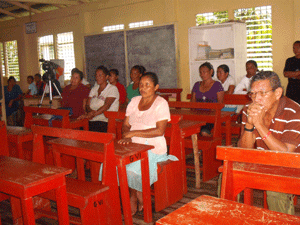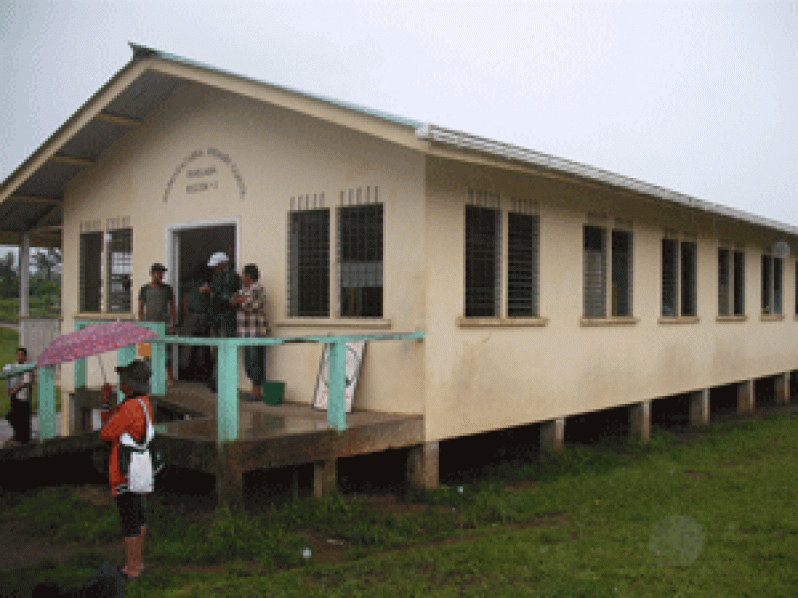Do not neglect planting land for gold search
MINISTER within the Ministry of Local Government and Regonal Development, Mr. Norman Whittaker has challenged residents of Haimacabra in the Moruca Sub- Region of Region One (Barima/Waini) to plant up their land, instead of leaving their homes and families to search for gold.  He threw out the challenge, last Friday, when he and a team, including Regional Executive Officer (REO) Nigel Fisher and Regional Democratic Councillor Marko Boyal, visited and spent the entire day interacting with people from various villages in the sub-region.
He threw out the challenge, last Friday, when he and a team, including Regional Executive Officer (REO) Nigel Fisher and Regional Democratic Councillor Marko Boyal, visited and spent the entire day interacting with people from various villages in the sub-region.
At the Haimacabra Primary School, the Minister encouraged those in his audience to be open about their concerns and recommendations.
He told them that there was no guarantee that persons leaving to look for gold will actually find it and that they should, therefore, “work the land.”
Whittaker said, while nothing is wrong with pursuing gold, it has been observed that farms are being neglected.
If they so desire to search for gold, he suggested they plant the land first, so that, in the event that no gold is found, they can still have something on which to fall back. “The land wouldn’t fail you,” he emphasised.
On a different note, Whittaker urged the Village Council to approach non-governmental agencies, such as United Nations Children’s Fund (UNICEF) and United Nations Development Programme (UNDP), among others, to request funding for specific projects.
He made the suggestion in the context of Government not being able to take care of every single need of the people. He, however, asked them to consider that sector ministries are still trying to lend a helping hand, apart from the Regional and Neighbourhood Democratic Councils.
Political elements
The Minister repeatedly reiterated that his intention was not simply to visit and promise them things. But he noted that, whatever government promises, it tries to accomplish, unlike other “political elements” who come just to paint a bad picture of the country and make big promises that they cannot fulfil.
Whittaker requested teachers present to help their students obtain their birth certificates, admonishing them:“You can’t say that they can’t be registered because they have no birth certificate. A child has a right to an education.”
He pressed the teachers to assist the authorities in getting the relevant information so that the certificates could be issued.
Whittaker pointed out that the document is important to securing other documentation, such as passports, identification  cards and drivers’ licences.
cards and drivers’ licences.
Referring to the issue of trafficking in persons (TIP), he said residents must find out the details of the employment being offered them or their children before they decide to accept it.
“Sometimes it’s your own family that does this to you. And you end up punishing because you were lied to.
“Nothing was signed, so when we accost the culprit, he says he doesn’t know the person we are talking about. Don’t send your children just like that. Find out if what they’re telling you is true before you go,” was his advice.
A health worker said the village was up to date with certain drugs and vaccines but their problem is transportation to get serious cases and pregnant women out for medical attention.
According to her, the most common sicknesses in the village are cold and fever.
Never attended
A teacher related that the primary school started out with four teachers and 86 children, 95 percent of whom never attended classes before. Consequently, she said it is difficult to work with the children.
She spoke about the steps on the building also being used as the teachers’ living quarters.
REO Fisher made a commitment to have someone with technical skills return to the village and do an estimate so as to have work on the steps done.
A resident told the visitors that the village needs a trained midwife and a medex as there are over 90 families there and a community health worker said she has training in midwifery but lacks the resources and facilities to perform the duties.



.jpg)








